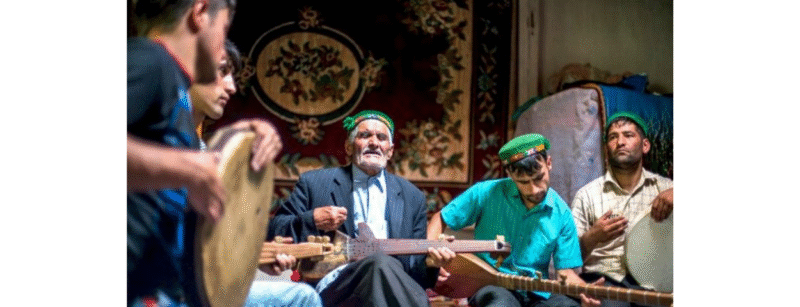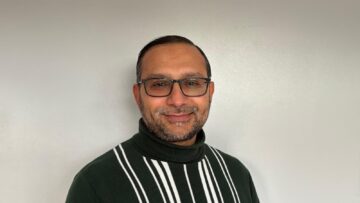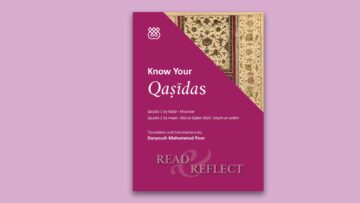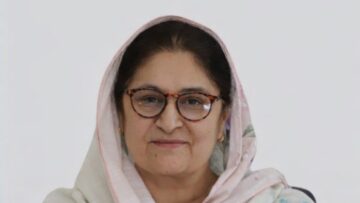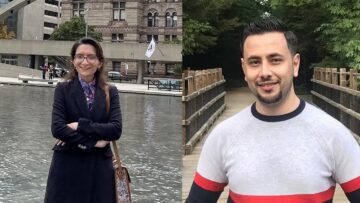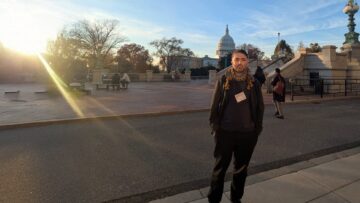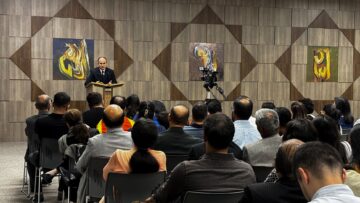Dr Otambek Mastibekov, Manuscript Researcher and Cataloguer in the Ismaili Special Collections Unit, set up Maktab-i Madḥiya-khānī in Tajikistan in 2011.
On July 2nd I gave a talk called “Restoring the Values of the Past: Creating a School of Music in Tajikistan”, which was part of The Silk Road: A Living History exhibition, presented by the Aga Khan Foundation UK. The talk was about the role of music and dance within the Ismaili communities of Tajikistan and the impact of Maktab-i Madḥiya-khānī (School of Devotional Literature), which I established in 2011, on religion and culture. You can watch the talk here.
Madḥiya is a poetic genre in Persian and Arabic literature. For the Ismaili Muslims of the Silk Road—in Tajikistan, Afghanistan, Western China and Northern Pakistan—madḥiya is devotional singing that embodies the art of music, religion, philosophy and ethics. Known in the region as madḥiya-khānī (singing madḥiya) or qaṣīda-khānī (singing qaṣīda), its origin goes back, according to tradition, to the 11th century poet, philosopher and traveller Nāṣir Khusraw (1004-1088 CE). (You can follow the route of his Safar-nama, or “Travelogue”, from Central Asia to the Mediterranean Coast, Egypt, Arabia and back through this interactive map.)
Due to the broadness of the theme and time limitation, it was not possible to explore the School of Music in real depth during the talk. Therefore I want to add a few important words here on two aspects. First, the main reason for establishing the school. Second, why the relationship between the IIS and Maktab-i Madḥiya-khāni is important for the future of this tradition.
The Madḥiya-khānī tradition has come under threat three times since the late nineteenth century. First, when Badakhshan came under the Afghan ruler in 1883 and under the Manghits—both dynasties were Sunni Muslims and made all attempts to eradicate Ismailism. Second, when Badakhshan of Tajikistan became part of the USSR and all kinds of religious practices by all religious communities came under threat. Third, when the funeral ceremony of Charāgh-rawshan was shortened in length from the full night, which significantly reduced the amount of madḥiya-khānī that was played as part of the ceremony.
Despite these three harmful waves, madḥiya-khānī was resilient, but after each episode certain norms and values were lost. So it was from here that the idea of establishing the school—instead of opposing the political upheaval or the religious authorities—came into my mind. In the first instance, I was thinking about how to preserve and restore this valuable heritage. But when I started to work on it, the ideas expanded and I planned to transform madḥiya from amateur performance to professional and from the local milieu to the global. Therefore I chose to teach four subjects in the school:
- Madḥiya as a source of Islamic ethics
- Poetical aspects of madḥiya
- Art and music of madḥiya
- A history of madḥiya and Islamic history through madḥiya
Since the school has been set up, I have developed the links between it and the IIS, in particular the work of the Ismaili Special Collections Unit (ISCU), where I work as a Manuscript Researcher and Cataloguer. Madḥiya-khānī in its present sense is embodied in the performance, but it has a strong link with the past, where the text as a primary source plays a vital role. Exploration of this relationship between the original text and the current life of the madhiya is essential to sustaining it as a living tradition. ISCU is a unique place, where a vast collection of Persian manuscripts, including those from Badakhshan, are collected. The original texts of around 90% of madḥiya/qaṣīda that are recited by the IsmailisAdherents of a branch of Shi’i Islam that considers Ismail, the eldest son of the Shi’i Imam Jaʿfar al-Ṣādiq (d. 765), as his successor. are identifiable in these manuscripts. Therefore ISCU is the first path towards finding the original sources for Maktab-i Madḥiya-khāni.
As well as this, ISCU scholars based in Khorog, including Shohzodamamad and Umed Mamadsherzodshoev, have given sessions in the school as visiting lecturers. I plan to involve more IIS scholars in the future to strengthen the intellectual capacity of the school—and continue to preserve this unique and important Ismaili heritage.
Dr Otambek Mastibekov

